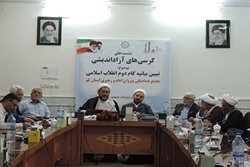 The seminary and university teacher said that no other revolution in the world could provide a revolutionary system-like theory and sustain itself for forty years.
The seminary and university teacher said that no other revolution in the world could provide a revolutionary system-like theory and sustain itself for forty years. RNA – Speaking at the fifth conference of the Assembly of Coordination of the Followers of the Imam and the Supreme Leader of Qom Province on the topic of “Explaining the Statement on the Second Phase of the Islamic Revolution” at Tolo Mehr University in Qom, Hujjat al-Islam Dr. Mohsen Mohajerinia, a political scientist and researcher, explained Ayatollah Khamenei’s Statement on the Second Phase of the Islamic Revolution and said this document is considered as ideology, thought, political theory, resistance strategy and governmental jurisprudence.
His Eminence added, “The statement as a political discourse is a very important subject, the centre of which is the principle of ‘the theory of the revolutionary system’ in the threefold process – the pre-revolutionary period, the first phase in the post-revolutionary period and the second phase in the run-up to the revolution – and the path of this process focuses on the civilizational discourse of the Islamic Revolution.”
Explaining the concept of discourse, Hujjat al-Islam Mohajerinia said, “A discourse is a collection of thoughts, opinions, actions and behaviours which together, create an identity, a lifestyle and a model of the system of knowledge. The Statement on the Second Phase of the Islamic Revolution can be assessed within this framework and it’s considered as a single discourse. In the statement, the Islamic Revolution has been explained with all its principles, foundations, goals, structure and functions as a single discourse.”
The seminary and university teacher argued that discourses are never exclusive, said, “When we discuss the Islamic Revolution, the opposing discourse comes to mind as well. When a discourse is created, an opposing discourse also accompanies it. The discourse which arose against the Islamic Revolution was the discourse of liberalism and socialism.”
He said, “No other revolution in the world could provide a revolutionary system-like theory and sustain itself for forty years. No other revolution could remain on the basis of its eternal slogans and after forty years, they can’t claim that the slogans of their revolution are eternal because those revolutions aren’t rooted in eternal human and divine nature.”
Hujjat al-Islam Mohajerinia added, “Today, in political science, not only don’t they consider the Islamic Revolution as sacred but also a kind of illness and instability in society but our revolution, with its slogans and its anti-imperialist and anti-colonial goals and functions, is sacred because it has its roots in eternal humanity and divine nature.”
Rasa News Agency
112/976